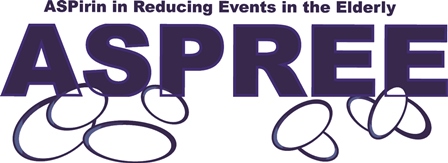Study celebrates with Hobart participants

Study celebrates with Hobart participants
Progress of a world-first clinical trial involving more than 2000 older Tasmanians will be outlined in Hobart tomorrow (Tuesday 21st October).
Progress of a world-first clinical trial involving more than 2000 older Tasmanians will be outlined in Hobart tomorrow (Tuesday 21st October).
The trial, called ASPREE, is the largest primary prevention aspirin study ever undertaken in the elderly. Almost 900 participants in the Hobart region are enrolled in the study, with approximately 170 people expected to gather at the event.
ASPREE (ASPirin in Reducing Events in the Elderly) has so far enrolled more than 15,500 Australian participants in Tasmania, South Australia, the ACT, southern NSW, Wollongong and Victoria.
The trial is investigating whether a daily low dose of aspirin can potentially delay or prevent the onset of common age-related diseases such as cardiovascular disease (heart attack and stroke), dementia and some cancers in healthy people aged 70 and over.
Professor Mark Nelson, a Professorial Research Fellow at the University's Menzies Research Institute Tasmania, and Chair of General Practice at the University of Tasmania, is a Chief Investigator of the ASPREE study. He believes the study is extremely relevant for Australia's ageing population.
"The ASPREE study is looking at the potential of aspirin to maintain good health in older Australians, something that is increasingly important as our population ages," said Professor Nelson.
The ASPREE study aims to answer the question of whether people over 70 who take daily low dose aspirin will lead healthier lives for longer. Doctors often prescribe aspirin for secondary prevention - to prevent subsequent heart attacks and some forms of stroke. ASPREE will determine if daily low dose aspirin prevents or delays the onset of cardiovascular disease as well as mental decline, depression and some cancers in the healthy elderly.
Professor Nelson said that while aspirin had the potential to extend good health, it was also known to have side effects, such as increased bleeding. The results of the ASPREE study would determine once and for all whether the benefits of daily low dose aspirin outweighed the risks in the healthy elderly.
ASPREE is on track to recruit 19,000 healthy older people in Australia and the USA. Professor Nelson explained that Australia's recruitment success over the past three years has resulted in a new target of 16,500 participants.
"ASPREE's recruitment in Australia is driven by a network of 2,800 GPs as co-investigators, who invite their eligible patients to enrol in the study. Due to Australia's great recruitment success, Australia's original recruitment target has increased from 12,500 to 16,500; making it the largest clinical trial ever conducted in the country. This is a unique opportunity for senior citizens in Tasmania to participate in a trial of international significance," said Professor Nelson.
Eligible participants are randomly assigned to take 100mg of aspirin or a placebo tablet daily and undergo annual study health checks for an average of five years.
Early results of the ASPREE study should be known by 2018.
-ENDS-
About ASPREE
The ASPREE study is being funded by the US government's National Institute on Aging, with funding support also received from the National Health and Medical Research Council (NHMRC) of Australia and the Victorian Cancer Agency (VCA). The ASPREE study is currently calling for healthy Australians aged 70 and over in: Melbourne, regional Victoria, Tasmania, ACT, southern NSW, Wollongong and South Australia. To be involved in the trial, speak to your GP, or call ASPREE directly on 1800 728 745 (toll free from a landline) or visit www.aspree.org
Note to editors:
Primary prevention studies - examine methods to delay / prevent onset of disease
Secondary prevention studies - examine methods to prevent re-occurring disease/events e.g. heart attack, certain types of stroke
Date & Time of the study update:
Tuesday 21st October, 10am - 11.45am (presentation finishes approximately 11am)
Lecture Theatre, Room 115, Medical Science Precinct, University of Tasmania, 17 Liverpool Street, Hobart
Photo opportunity:
- Professor Mark Nelson, ASPREE Chief Investigator and Chair of General Practice at the University of Tasmania (presenter)
- Dr Carlene Britt - ASPREE Regional Manager
- Local ASPREE participants
For more information/to arrange interviews: 1800 728 745
Contact:
Phone: 1800 728 745
Email: